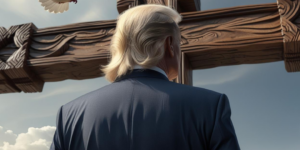Archbishop: Pope Francis’ Apology for Past Sins Only a Start to Repair What’s Broken
Pope Francis’ recent apologies to Canada’s First Nations was a good start to correcting the egregious wrongs done to many indigenous peoples in the name of “Christian mission.” Now, other Christians should follow suit.
In addition to the many pure-hearted, sacrificial missionaries, for centuries there were other westerners who went around the world with a narrow and reductionist view of the gospel that was infused with cultural superiority. Others feigned a missionary enterprise altogether in order to advance an unfair political and economic advantage. Certainly some good emerged from this work, but the downside is that some Western Christians managed to seriously damage many indigenous cultures, customs, perspectives and leadership.
This was antithetical to the gospel of the New Testament, which envisages the message of Jesus as always contextualized. It’s time for the whole church to apologize for these social sins, and to make sure that we have thoroughly learned from errors of past centuries.
True Christian mission is never about forcing people to join a religion or adopt a culture. Nor is it simply about externally converting people and checking them off a list of those going to heaven after they die.
Being “missional” in God’s kingdom is always about giving people the opportunity to engage with God, the Bible and Jesus within their own cultural context.
It is about helping people experience the life-giving presence of Jesus Christ in their lives through the divine work of the Spirit. It is about ensuring people know Jesus as Lord of life now, as well as in the life of the kingdom of God to come.
God always attracts the needy and poor through His love. Our self-sacrificing love for the very people God loves can never be merely about making more Christians. They need to be treated as fully human, not viewed as “people groups” to Christianize.
While the broader evangelical world rightfully recognizes the heroes of faith who gave their lives to take the gospel of Jesus across the globe, we must also recognize some of the sins that accompanied our global missions. Too often Christians have imposed our cultural Christianity through political and economic power and profited from colonialism rather than from calling out the wrongs and racism of colonial structures.
Political power, according to the great reformer Martin Luther, makes what is right wrong and what is wrong right.
But a true theology of the Cross of Jesus Christ states the problem for what it is, acknowledges the sin and works to find correction and forgiveness.
True Christian mission desires only to take the person of Jesus to the world through sacrificial love and service without taking advantage of the people we serve, or ruling over them. Their choice to love and follow Jesus is their own. All we can do is give the invitation of Jesus.
The church of the global south, where I live and minister, was blessed by the Christian missions of the past that brought the message of Jesus, who loved us fully, served the poor, eradicated illness, built schools, codified languages and provided fresh drinking water, to name only a few of the many life-saving missional projects.
Thus, the so-called campaign for reparations is an inadequate solution to genuine repentance and reconciliation.
Today’s generations bear the burden to learn from the past and need to invest in creating a new world for future generations. In our world obsessively commercialized we fail to realize that money simply cannot solve these problems. And after all, how far back does one go? What of India’s, dalits whose ordeals go back thousands of years? Will the upper caste make reparations for millennia of exploitation? Is it even possible?
Yet, just because this solution isn’t practical, or even advisable, it doesn’t mean we can wash our hands of the necessity to do something to restore what’s broken.
A couple of decades ago, about 700 low caste leaders accused the Indian church of participating in caste racism. At a national event, I felt compelled to accept my part and ask for forgiveness and I requested time to put things right. It was a powerful, impactful experience for me and for them. Today, we are still working together to make things right, but the key word here is together. It is a long, long process.
To apologize, we must first acknowledge the shortcomings, both past and present. For example, do global Christians understand that using a term such as “discipling a whole nation” is often viewed in countries such as India as being political, an effort to turn India into a Western lackey?
This kind of evangelical sloganeering like “discipling a whole nation” or “reaching unreached people groups” is deeply problematic. Why is it that only people living outside the Christian West are among the unreached, or represent a nation to be discipled? This leads to the absurd assertion that there are Western examples of whole discipled nations.
Do we also accept that some ministries in developing nations carry out projects funded by the West to meet fundraising expectations, and not due to a deep biblical understanding of Jesus’ mission of love and mercy in the context of those communities?
Christian leaders in the global south have also failed. The people we live among are not hostile to Jesus, but they are hostile to what they see as a Western religion. We have not listened to our own people. Even as an Asian, I cannot simply say the West is responsible for the problems. I must acknowledge that as part of the global church, these are my sins, too. I apologize for them.
With today’s global communications, where every sin against humanity is amplified, anything short of a collective acknowledgement of social sin is simply inadequate. The Pope’s apology should be the beginning, not the end, of finding our way through history’s errors together. {eoa}
Archbishop Joseph D’Souza is an internationally renowned human and civil rights activist. He is the founder of Dignity Freedom Network, an organization that advocates for and delivers humanitarian aid to the marginalized and outcastes of South Asia. He is archbishop of the Anglican Good Shepherd Church of India and serves as the president of the All India Christian Council.




























































